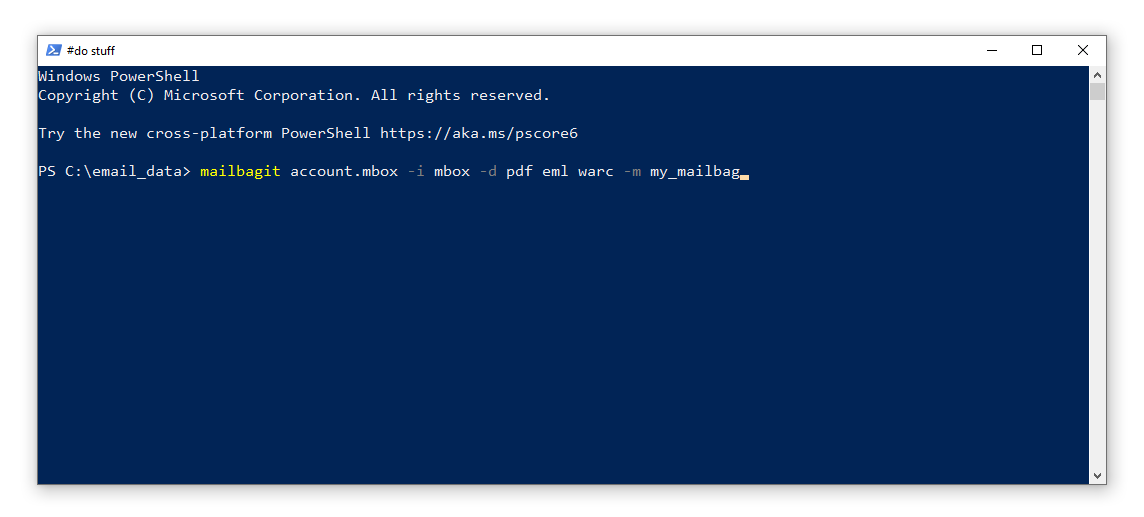Using the mailbagit command line utility
When mailbagit is installed, it makes the mailbagit command available in you command line. mailbagit -h can run in Terminal on macOS or Linux, or CMD.exe or Powershell on Windows. Download and install mailbagit.

Download a sample MBOX file for training and testing.
Examples
mailbagit path/to/inbox.mbox -i mbox -d pdf warc --mailbag-name account_name
Packages an MBOX file at
path/to/inbox.mboxinto a mailbag named “account_name” with PDF and WARC derivatives for each message.mailbagitwill attempt to use anyX-Folderheaders to arrange derivatives.
mailbagit path/to/export -i pst -d eml html pdf -m allfacstafflistserv
Packages all the PST files found in
path/to/exportand any subfolders into a mailbag named “allfacstafflistserv” with EML, HTML, and PDF derivatives.mailbagitwill attempt to use both the directory structure of the PSTs as well as the email folder tree within the PST(s) to arrange derivatives.
mailbagit path/to/directory -i eml -d pdf-chrome warc -mailbag-name fundraising_emails -r
Packages all the EML files found in
path/to/directoryand any subfolders into a mailbag named “fundraising_emails” with PDF and WARC derivatives with the PDF derivatives using headless Chrome.mailbagitwill use the both the directory structure of the EMLs as well as anyX-Folderheaders to arrange derivatives.
This examples also uses the
-r(dry-run) flag, which will parse all EML files, but will not move, change, or package them into a mailbag. If there are any parsing errors, this will write an error report to thefundraising_emails_errorsdirectory.
💡 mailbagit can also package the .ost file that the Microsoft Outlook desktop client uses to store email locally. OSTs are just treated as PSTs. If you use Outlook, you might be able to find your local OST file at C:\Users\[username]\AppData\Local\Microsoft\Outlook.
Arguments
The arguments listed below can be entered in the command line when using mailbagitor entered in mailbagit-gui fields
Mandatory Arguments
- path:
A path to email to be packaged into a mailbag. This can be a single file or a directory containing a number of email exports.
- -m –mailbag:
A new directory for the mailbag, such as
/path/to/my_mailbag, or justmy_mailbagto use the same location as the source email. Must be a valid directory or file name and must not already exist. - -i –input:
File format to use as input for a mailbag. Argument takes single input. e.g.
-i imapor-i pst - -d –derivatives:
Specifies a single or list of derivative formats that mailbagit will create and package into the mailbag. Argument takes multiple inputs. e.g.
-d eml pdf warc
Mailbagit Optional Arguments
- -v –version
Reports the version number and exits.
- -r –dry-run
Performs a test run that will not alter any files other than writing an error report. When this flag is used,
mailbagitparses all the email it is provide and formats derivatives as much as it can without writing anything to disk. If there are any error or warnings, this will create an error report with anerrors.csvlisting all issues as well as a full stack trace in a.txtfile. - -k –keep
Keeps the source files as-is and copies instead of moving them into a mailbag.
- –css
Path to a CSS file to override the included CSS when creating PDF or HTML derivatives Argument takes single file path as input.
- -c –compress
Compresses the mailbag as a ZIP, TAR, or TAR.GZ e.g.
-c zipor-c tar.gz - -f, –companion-files
Allows for companion metadata files to be packaged alongside email export files. When this option is used,
mailbagitwill recursively include all the files in the directory provided into a mailbag. - -l, –external-links
Will crawl and add external
<a href="">links to WARC derivatives as response records
Bagit-python arguments
Mailbagit also accepts most bagit-python arguments. Thus, you can provide arguments like --processes 2 or arguments to add metadata such as --source-organization University at Albany, SUNY
The only bag-python arguments that mailbagit does not support are -log, -quiet, -validate, -fast, and -completeness_only
If you would like to validate your mailbag, mailbagit comes with bagit-python installed. Thus, you can run:
bagit.py --validate /path/to/mailbag
What mailbagit creates
mailbagit creates a “mailbag” according to the Mailbag Specification. The mailbag will be named using the provided mailbag_name and will be a folder, unless compression was used. In this folder, you will find a payload folder called “data” which contains the original export formats, as well as attachments, and any derivatives you selected.
Mailbags also contain one or more mailbag.csv files which list all messages that were packaged. The first column is “Error” where any errors in the packaging are reported. If the message was parsed and generated derivatives successfully, this field will be blank. The Mailbag-Message-ID is a sequential ID number that is unique within a mailbag. This ID is used to name all the derivative files in the mailbag. mailbag.csv files also document the number of attachments and contain common email headers such as Message-ID, To, From, CC, and Subject.
As valid “bags,” according to the Bagit specification, mailbags also contain manifests containing checksums for all files within the bag. These checksums are useful to establish fixity or show that the files have not changed over time.
mailbagitalso generates detailed error reports